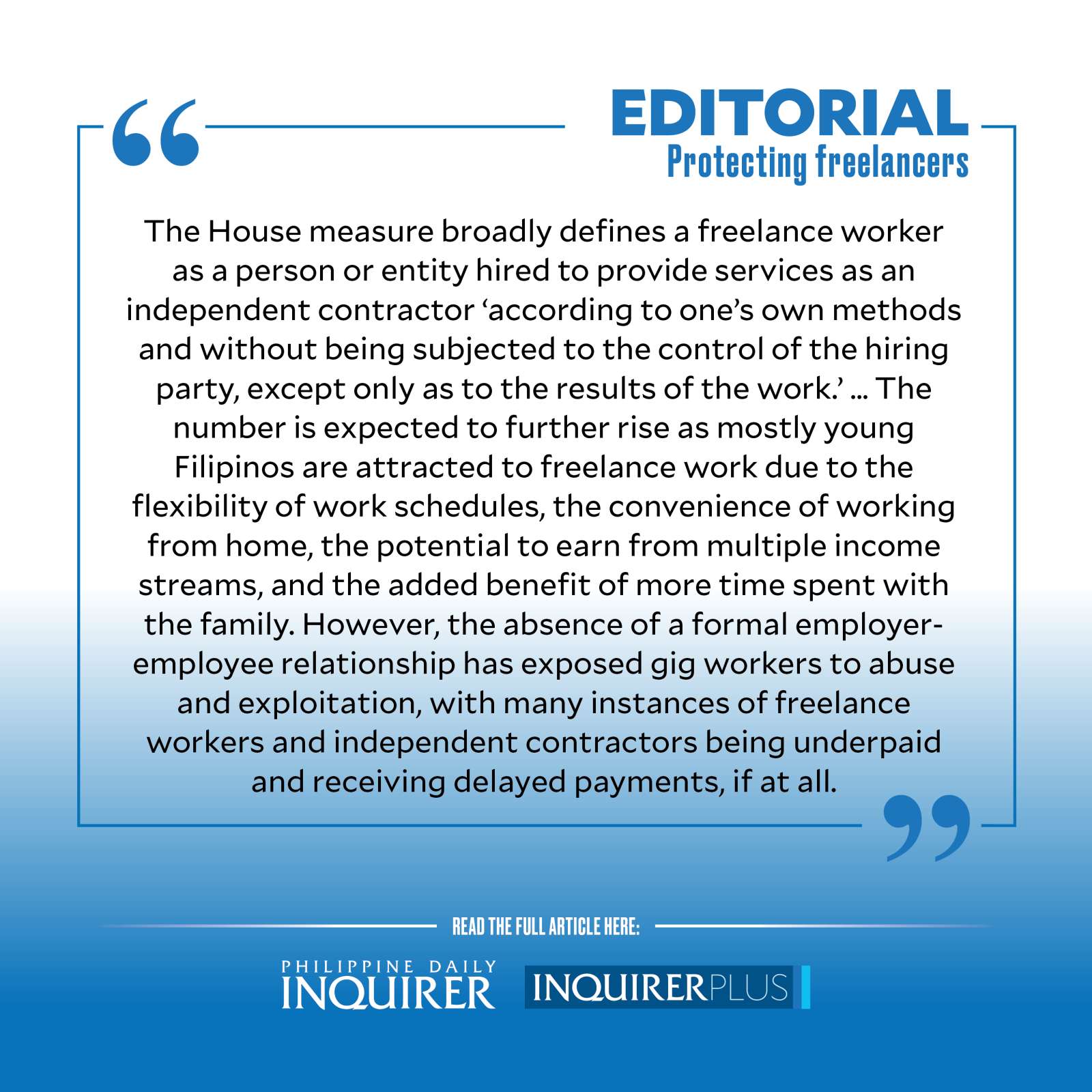Protecting freelancers

Consider it a major step toward securing more rights and much-needed protection from abusive employers for the increasing legion of Filipino freelance workers. The House of Representatives’ recently approved measure, House Bill No. 6718 or the Freelance Workers Protection Act, recognizes these workers’ growing clout in a rising digital economy and formalizes their benefits, while establishing a formal grievance system that would address issues of conflict with their employers.
Under the unanimously approved bill, the hiring party and freelance workers must enter into a written contract that clearly stipulates the workers’ task, when it should be finished, and how much and when they are supposed to be paid for the completed job. Deviations or modifications of the terms in the contract, such as reduction in the fees or an expanded scope of work, are not allowed, unless both parties agree and sign the revised contract. The approved bill also makes it illegal to engage a freelance worker without a contract, or to delay payment beyond 15 days from the date stipulated in the contract. In case of contract violations, aggrieved parties can elevate their complaint to the Department of Labor and Employment through the Undersecretary for Workers with Special Concerns, or even file a civil case. Violators face a fine that ranges from P50,000 to P500,000.
The measure couldn’t have come at a more opportune time, as the number of freelance workers has significantly increased amid the growth of the so-called gig economy, which relies on short-term contracts. With an estimated 1.5 million workers in the gig economy, the Philippines has one of the largest pool of freelancers among 22 countries surveyed by the payment platform PayPal. The growth has been spurred in part by the pandemic, which opened up numerous opportunities for remote work here and abroad.
The House measure broadly defines a freelance worker as a person or entity hired to provide services as an independent contractor “according to one’s own methods and without being subjected to the control of the hiring party, except only as to the results of the work.” These include those in the creative and copyright-based industries, such as content creators, copywriters, film scorers, music arrangers, photographers, and graphic artists, as well as on-demand courier and delivery personnel. The number is expected to further rise as mostly young Filipinos are attracted to freelance work due to the flexibility of work schedules, the convenience of working from home, the potential to earn from multiple income streams, and the added benefit of more time spent with the family. However, the absence of a formal employer-employee relationship has exposed gig workers to abuse and exploitation, with many instances of freelance workers and independent contractors being underpaid and receiving delayed payments, if at all.
“If no laws are in place to protect our gig economy freelancers or a formal grievance system [established] to enforce their rights, they will be susceptible to all kinds of abuse,” Speaker Ferdinand Martin G. Romualdez noted, as he predicted an “exploding growth spurt” for this “significant driver” of the economy that is still recovering from the extensive damage wrought by the pandemic.
Fortunately, similar Senate bills hasten the likelihood of this measure winding up as an actual law. Sen. Sherwin Gatchalian last year filed the Freelancers Protection Act that also seeks to provide social protection for gig workers, as it noted that freelancing has become a primary career choice, especially among young workers aged 21 to 35. Forbes has, in fact, predicted that by 2027, the majority of the world’s workforce will be freelancers. Such trend can be seen in the Philippines, which ranked as the sixth fastest-growing freelance economy in the 2019 Global Gig Economy Index of Payoneer, with a 35-percent growth in freelance earnings.
Sen. Joel Villanueva has also filed Senate Bill No. 136, or the Freelancers Protection Act, to plug the gaps in the current labor laws in response to the needs of this new and growing class of workers that is seen to be a permanent feature of the labor force. “The rise of Filipino freelance workers signals that the Fourth Industrial Revolution is indeed upon us, something that the pandemic cannot stop,” Villanueva said.
Given the firm support from both houses of Congress, it should not take much time nor effort for legislators to harmonize the pending measures into a law that will provide freelance workers the rights and benefits due them. After all, the gig economy’s growth is inevitable and shows no signs of slowing down, and freelance workers are definitely here to stay.




















